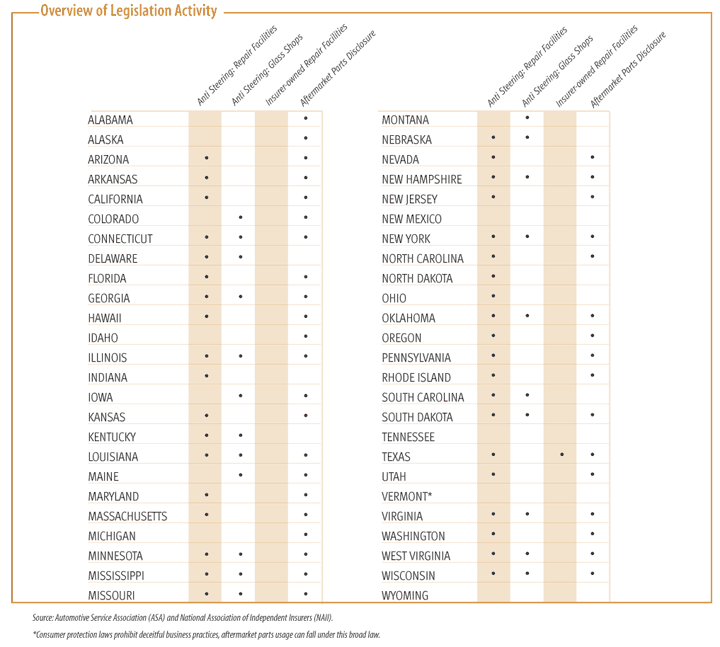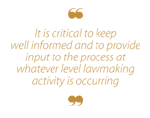
| industry insights | |
| introduction | |
| features | |
| Legislation and Regulation in the Auto Claims Industry | |
| Industry Roundtable Interview | |
| Caliber Collision Centers | |
| departments/columns | |
| who we are | |
| archives | |
| CCC UpFront home |
| feature |
| Legislation and Regulation in the Auto Claims Industry |
| By Robert Guttman |
Few would dispute the importance of this topic. There are many states where new legislation and changes to existing regulations are introduced each year, in addition to activity at the federal level. It is critical to keep well informed of significant developments and to provide input to the process at whatever level lawmaking activity is occurring. 2003 Through The Rear-View Mirror: Anti-steering - An overwhelming number of states have passed some form of anti-steering law effecting repair facilities and in many instances glass shops. These states have made "steering"-the practice (as sometimes characterized by legislators) of insurers "directing" where consumers have vehicles repaired-a focus. These laws typically prohibit "steering" unless the insurer is asked for a recommendation by the vehicle owner. Violations of these laws generally constitute unfair trade or claim practices, potentially resulting in monetary penalties. Direct Repair Facility - Some direct repair program bills require insurers to disclose any financial stake an insurer has in a repair facility. Direct Repair Facility bills often have objectives similar to anti-steering regulations in that both are designed to ensure a vehicle owner has free choice of where the car is repaired. A related form of legislation prohibits insurance company ownership of repair facilities.
Aftermarket Parts - As aftermarket parts become a larger aspect of the collision repair industry, so too do the rules that govern their use. Thus far, aftermarket parts legislation has been focused primarily on requiring disclosures to consumers that these parts have been used, or considered for use in an estimate, rather than governing the specific use of such parts, though some laws exclude the use of aftermarket parts on newer vehicles as in Massachusetts 211 CMR 133.04. Most bills call for clear and full disclosure from repair facilities that the estimated price of repair is based on the cost of OEM, aftermarket, or recycled parts. Diminution in Value (DIV) - In most states, insurers are obligated by law to return a customer's vehicle to pre-accident condition. This requirement is sometimes cited when other than OEM parts are used to repair the vehicle or if the quality of repairs is questioned. Repair may restore a vehicle to its prior condition, but some claimants assert that the vehicle has decreased in value in spite of the repairs. A handful of states allow claims for such alleged decrease in value, including Georgia. In states such as Arkansas, Iowa and North Carolina, among others, courts have recognized DIV as a basis for recovery while other state courts in Massachusetts, South Carolina, and Texas have rejected that notion. Claim Practices - Some states annually introduce legislation or administrative regulation changes relating to claim handling practices. They often include standards for the valuation of vehicles and requirements for the preparation of repair estimates. Such legislation and regulation aims to set standards for fair treatment of consumers and to make expectations clear for insurers and repair facilities. Consumer "Bills of Rights" - This type of legislation and regulation seeks to establish standards that specify how consumers are to be treated and provides that consumers be informed of their rights through written or posted notice. For example, a pending federal version would require automobile manufacturers to disclose information to vehicle owners and repair facilities that is necessary to diagnose, service or repair the vehicle. Overview of Legislation Activity: By keeping abreast of the latest legislative and regulatory developments we help operate our businesses more effectively, and by participating in the process we can help shape the future of our industry. Robert Guttman is senior vice president and general counsel for CCC Information Services Inc. |

 Get a group of industry professionals together, and it won't be long before the discussion turns to the topic of legislation and regulation and how our industry is impacted.
Get a group of industry professionals together, and it won't be long before the discussion turns to the topic of legislation and regulation and how our industry is impacted.